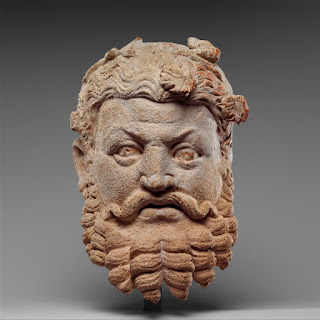Greek civilization influenced India in the period after Alexander's Indian campaign (circa 326 BCE). Greek influences on Indian sculpture, literature and astronomy persist to this day and have become part of India's cultural heritage.
The Greeks left important influences on Indian culture after Greco-Bactrian warrior kings from Central Asia overran parts of northern India (and modern day Pakistan). Greek artistic techniques influenced Indian art via the Gandharan School of art and sculpture. Indian classical texts like the Mahabharata and the Yuga Purana make special mentions of the Greeks referring to them as the Yavanas . The Greeks also influenced Indian astronomy- notably by introducing the signs of the Zodiac.
The Greeks in ancient India
Several Greco-Bactrian kingdoms were established after Alexander's conquest of Central Asia. Alexander's invasion of India was motivated by a desire to conquer the known world,but the exhaustion of his army prevented further advances into the country. The Greeks were able to take over parts of north India, after the decline of the Mauryan empire, and their presence was prevalent in the Indian culture..
The Greeks and Classical Indian literature
The Greeks are mentioned in Indian Classical texts, like the Yuga Purana and the Mahabharata, and Buddhist texts were also influenced by the Greek presence in Ancient India. The Greeks were known as Yavanas to the ancient Indians. The Yuga Purana (composed circa. 250 BCE), describes the Indo-Greek invasions in detail. The text gives special praise to Greco-Bactrian King Demetrius, referring to him as Dharmamitra, or 'Friend of Dharma'. The Mahabharata, a major Indian epic, features Bhagadatta, described as a Yavana King, who plays a prominent role in the epic's climactic war.
King Menander, a successor of Demetrius, conquered large parts of northern India and features in a major Buddhist text, the Milindapanha (Questions of Milinda). A philosophical dispute about Buddhism, between Milinda and the Buddhist sage Nagasena, comprises the bulk of the text.
Greek influences on Indian Sculpture
Greek artistic techniques influenced Indian art, largely via the Buddhist tradition;a trend that remained into the Gupta era. The Greeks are the first to give the Buddha a human form in Indian sculpture.
Having been persecuted by the eastern Sunga dynasty, the Buddhists joined the Greeks in their campaigns and this brought the two cultures even closer; Greek art greatly influenced Buddhism and the famous Gandharan School of art was born.
The Greek innovation of sculpting the Buddha in human form grew to become a major part of Buddhist iconography. The Greeks also introduced their own architectural and sculptural elements, like cupids, friezes and Corinthian columns into the Buddhist school. Several Greek Gods were incorporated into Buddhist architecture, including Heracles, who became equated to Vajrapani, the mythological protector of the Buddha.
Greek techniques survived well into the Gupta period, whose realistic anthropomorphic representations of the Buddha reflect the legacy of the Greek artistic influence.
The Greeks and Indian Astronomy
Indian astronomy is indebted to that of the ancient Greeks. The Gargi Samhita of the Yuga Purana credits the Greeks as the originators of astronomy, and Aryabhata attributes the Zodiac to the Greeks. The Greek astronomical tradition introduced other innovations in Indian astronomy, like giving names to the days of the week and a more precise calculation of the year's length.
Conclusion
The Greeks influenced Indian culture thanks to a complex of social and political factors. Some of these influences persist to this day: the Milindapanha is a valued Buddhist text, Milind is a common Indian name, and the Zodiac is widely known in Indian astrological practice. Ancient Indian temples and especially Buddhist stupas are major Indian heritage sites. The Greek influence is now a prominent part of India's cultural heritage.
Source https://www.indianetzone.com/















